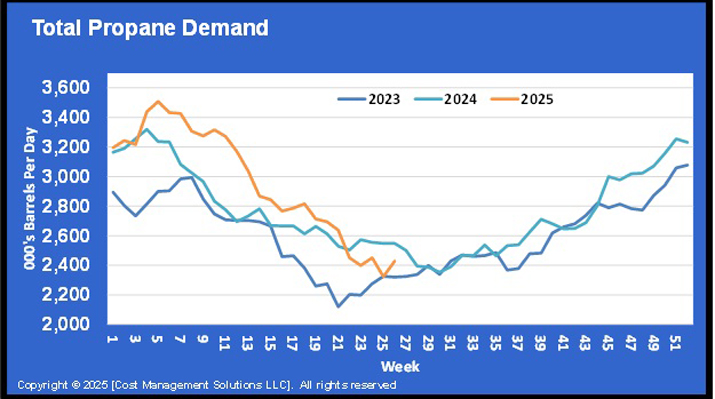Propane generators grow gallons, minimize impacts of harmful weather
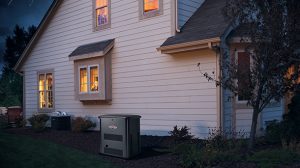
Only 27 percent of homeowners have a backup power source, despite an increase in power interruptions. Photo courtesy of Briggs & Stratton
It happens far too often. Homes and businesses lose power and face consequences that weren’t predicted or planned for – the most significant of which are financial losses.
According to Jesse Marcus, director of residential and commercial business development for the Propane Education & Research Council, statistics from B2B International and other sources shed light on these consequences. On average, homeowners experience 3.5 power interruptions every two years. More often than not, these power interruptions are short (four hours or less) and cost $1,250, on average.
Yet, despite these expenditures – typically rising to roughly $4,500 every two years, as homeowners lose spoiled food, eat at restaurants and pay for damage to their homes and electronics – only 27 percent of homeowners currently have a backup power source. Half of all homeowners believe it’s too expensive. Even business owners are held back by expenses, with 39 percent citing cost as the only reason they haven’t purchased backup power sources.
Marcus believes homeowners and business owners are focused on the wrong issues. Rather than only considering the cost of backup power sources like propane generators, they should instead concentrate on the expense of power outages. This is especially vital when considering the impact of severe weather events, which cost businesses and homeowners billions of dollars a year.
As severe weather becomes more unpredictable, there may be no better time for your customers to purchase a propane generator. Not only are they crucial in light of severe weather events and infrastructure issues, but they are also significantly influencing the propane industry’s overall growth prospects.
No longer a luxury
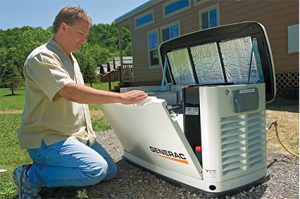
Standby generators can ensure home appliances continue to operate as intended, even during a power outage, and can minimize the potential financial impacts of severe weather. Photo courtesy of the Propane Education & Research Council
In years past, only people who frequently experienced long power outages chose to purchase backup generators. This is no longer the case, as even short outages can considerably influence people’s lives, not only in terms of finances, but with regards to their ever-increasing dependence on power, particularly to use appliances and electronic devices.
“Power outages impact our lives more today than ever before, so standby propane generators are becoming essential appliances now, rather than luxuries,” says Brian Northway, product manager at Briggs & Stratton Standby Power.
Since people are relying more on electricity for nearly every aspect of their daily lives, power grids are now being overused – to the point at which energy companies are struggling to recover from outages as quickly as they used to.
“If you lose power, you have to be prepared to lose it for a long period of time now,” says Jack R. Tarantin, a product manager at Ray Murray Inc. “Home standby generators fill the niche for continued and reliable electricity though, so that people can continue to function seamlessly and maintain their peace of mind during power outages.”
To avoid interruptions from power outages, especially during severe weather events, James Harris, regional vice president at Blossman Gas, advises people throughout the United States to purchase standby propane generators. They not only offer comfort and security but can also minimize the impending financial damage of severe weather by ensuring home appliances continue to work as intended. Standby generators have also become more viable for a larger number of homeowners in recent years due to their affordability.
For instance, a Briggs & Stratton power management system can power all electrical needs for a lower price because it learns the usage of specific appliances and routes power to whichever appliances homeowners need to use at a certain time. This ensures that they have access to each of their major appliances without ever having to generate power for all of them at once.
“By prioritizing their energy needs, homeowners no longer have to buy more expensive generators, which supply power to all of their appliances all the time, even when they’re not being used,” Northway says.
Expanding generator lineups
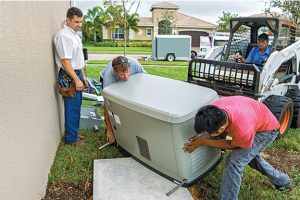
Kohler says power outages caused by severe weather have risen exponentially in the last 10 years. Photo: iStock.com/JodiJacobson
Due to the implementation of more affordable, technologically advanced propane generators, along with the ever-increasing popularity of standby generators since hurricanes Harvey and Irma, companies like Conger LP Gas and Texas Star Propane are expanding their propane generator lineups.
“We saw that adding propane generators for our customers was an added benefit,” says Bill Moore, alternative fuel sales manager at Conger LP Gas in Georgia. “Propane is the preferred choice for standby generators, as the fuel is stable and can last indefinitely, unlike gasoline- and diesel-fueled generators, which require more maintenance.”
In preparation for the 2017 hurricane season, Josh Kasprzak, co-owner and vice president at Texas Star Propane, along with co-owner Joel Sopchak, decided to begin selling generators. Since then, the company has sold more than 50 generators, many of which were used by victims of Hurricane Harvey.
“We realized we were missing out on a lot of potential growth,” Kasprzak says. “It became a life-changing decision not only for Joel and me, but for some of our customers as well. Without generators, they may have died.”
Although the impact of severe weather is not always a matter of life and death, it is the United States’ leading cause of power outages, which have risen exponentially in the last 10 years, Kohler notes. With this in mind, the company manufactures three types of propane-powered generators.
One option – a portable generator – is typically used on job sites (to power tools) because it is small and easy to transport. To provide users with another asset, Kohler offers portable generators that feature conversion kits, so they can run on propane, natural gas or gasoline. As a result, users only need to turn a dial and change hoses to switch fuel types.
In addition, Kohler offers a variety of standby propane generators, which permanently connect to a home’s electrical system and automatically restore power within 10 seconds after an outage.
“Depending on the size of the propane standby generator, it can power everything in a home and provide significantly more power than a portable model,” says Melanie Tydrich, senior channel manager at Kohler. “Plus, the homeowner doesn’t need to be present to fuel or operate a standby generator, like they would with portable generators. So, that’s a big advantage. Standby generators are ready to go 24/7.”
Furthermore, Kohler also offers large mobile generators that can be fueled with propane. Mobile generators are typically pulled behind trucks and used on construction sites, but can also be helpful to first responders and relief organizations, particularly when they arrive on-site to assist people following severe storms.
Staying warm all winter long
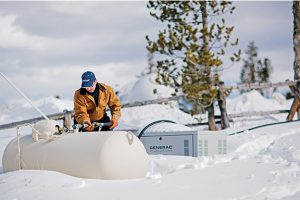
Propane generators are one solution for easing the strain on New England’s overloaded electrical grid. They’re especially important for home heating after severe winter storms. Photo courtesy of The Propane Education & Research Council
The significance of propane generators is not only noticed in warm weather climates, of course. Winter storms have just as much influence on people’s electricity and standard of living.
Every year, regions in the northern United States, such as New England, experience lengthy periods without power, often leading to frozen water lines, as many homes have hot water systems.
To prevent this issue and reduce the threat of considerable home and business damage, Leslie Anderson, president and CEO of the Propane Gas Association of New England, advises owners to purchase propane generators. The need is especially pressing in the region, as the ISO New England electric grid is unable to meet electrical demand.
“During the peak cold period, which lasted for 10 days this January, the New England power grid used more heating oil to fuel its generators than the state of Vermont uses in an entire year,” she says. “If we begin to plug in all the electric vehicles that states are talking about purchasing, then we will start seeing rolling blackouts again and propane generators will be in even greater demand.”
Preparing for long-term growth
A few years ago, homebuilders began to realize that more people were working at home and didn’t want to spend any time without their electrical needs. So, they decided to offer generators as added features that homeowners could purchase.
However, once the economic downturn occurred in 2008, that mindset was no longer widespread across the United States. Now that the economy is steadily improving and homes are once again being built, Tarantin is optimistic that the same mindset can (and will) occur again, perhaps sooner than later.
Northway believes propane tanks should be available on-site so customers can use propane whenever they need it. Customers should also know about the benefits of propane – especially its reliability and durability, thereby ensuring propane generators are never shut off – which will help improve their popularity with homebuilders.
Propane retailers can introduce these benefits to homeowners. By installing at least two burner tips (such as a water heater and range) that will run on propane during power outages, homeowners can purchase smaller, more affordable generators for emergency backups.
“Propane retailers should take burner tips very seriously,” Harris says. “That’s how we ensure customers for long-term sales.”
He continues, “If they don’t actively promote the increase of burner tips for existing customers, the demand for propane will decrease. Simply put, it doesn’t matter how much supply there is if there’s no demand.”
Tydrich is generally optimistic about the future of propane standby generators as well. The national electrical grid is aging and the number of power outages lasting more than an hour has risen steadily in the last 10 years. Not only that, but homeowners’ dependence on power is also increasing consistently – with no apparent signs of letting up.
“These trends point towards increased demand for residential backup power moving forward,” she says. “And I would expect that any growth in home standby generator usage will also be a positive for propane suppliers, both short and long term.”
Overcoming the devastation of Hurricane Maria
No words can describe the 2017 destruction of Hurricane Maria – the leveled buildings, the sullen expressions on Puerto Ricans’ faces or the overwhelming sense of loss. At a time when residents had every right to be angry and saddened by the catastrophe of the Category 5 hurricane, one man maintained his optimism, focus and hope for the future: Ramon Gonzalez Simounet, vice president of San Juan’s Empire Gas Co. Inc.
By maintaining an inventory of propane that could last for three months (18 million gallons – over 15 million more than the company had in the early 2000s), he and his associates were able to serve residents throughout the island.
“That was the key to saving people because there was no electricity or communication and all of the fuel terminals were closed the first couple days,” Gonzalez explains.
He was also able to fuel several CHP systems that had been installed before the hurricane; each of these systems generated electricity and hot water for residents.
“It was very rewarding to help so many people. The crisis hit hard at home and with our product and service we were able to bring joy and safety to Puerto Rico,” he says.
Off the grid: California’s rural communities discover gensets’ benefits
As California’s population begins to surpass 40 million, more and more residents are leaving Los Angeles, San Diego and San Francisco behind and settling in more rural areas. Most view the move as positive – there is far less traffic, pollution and noise, for starters – until they realize grid power isn’t available.
Although solar panels provide some electricity, residents soon find they must have standby propane gensets. Their fuel never goes bad and can work effectively in virtually any temperature. Not to mention, fuel storage is incomparable. For example, a 500-gallon propane tank can run a 20-kilowatt (or smaller) genset for weeks or even months before it needs to be refilled.
“With California’s utility electricity increasing 6 percent annually, and expected to go even higher as the state pushes for 5 million electric vehicles by 2030, more Californians will continue to move to rural areas the next few years and discover propane gensets’ superior benefits,” says Greg Gilbert, owner of Autumn Wind Associates Inc.









